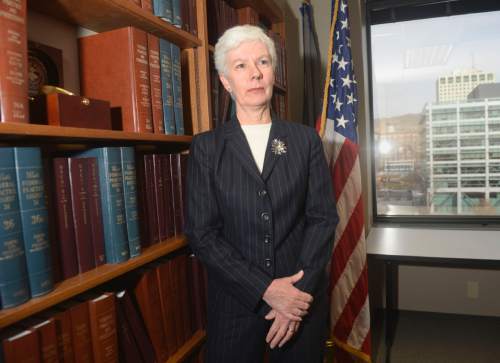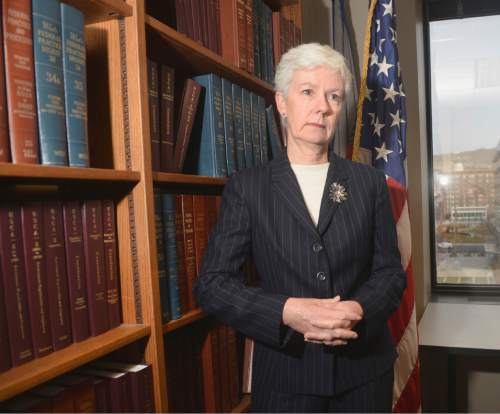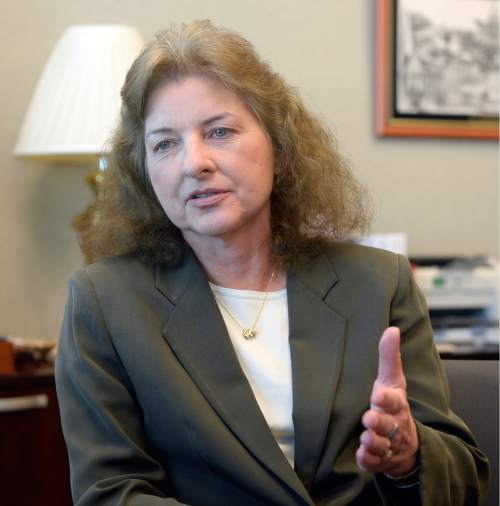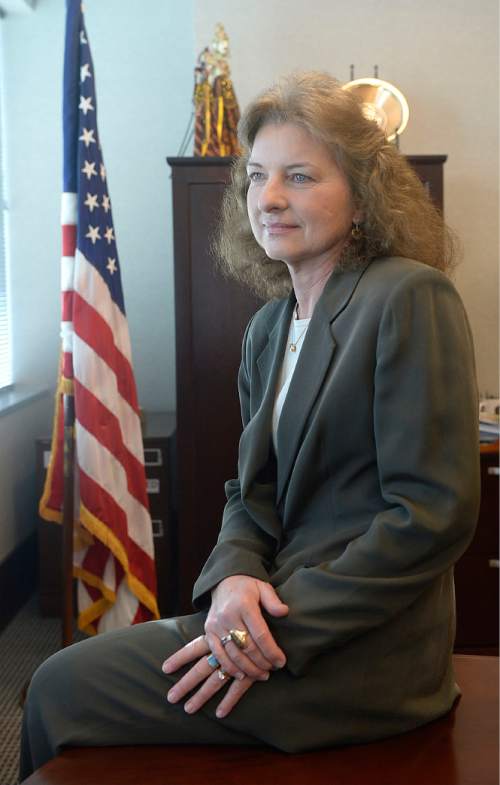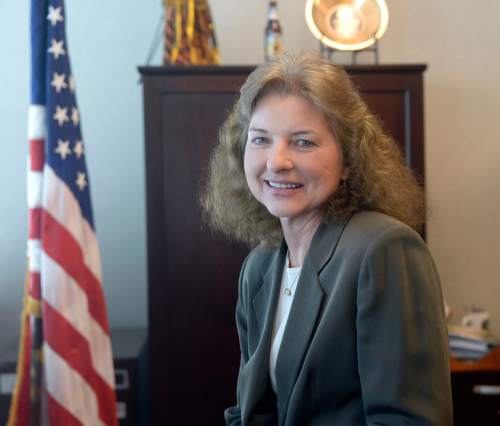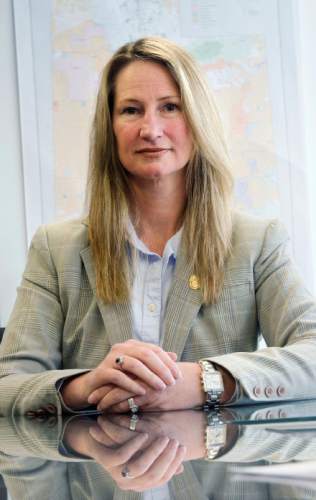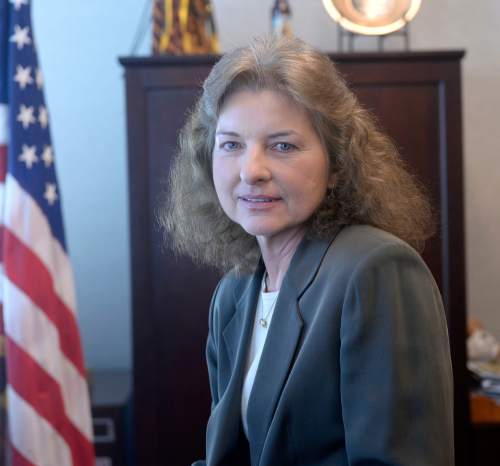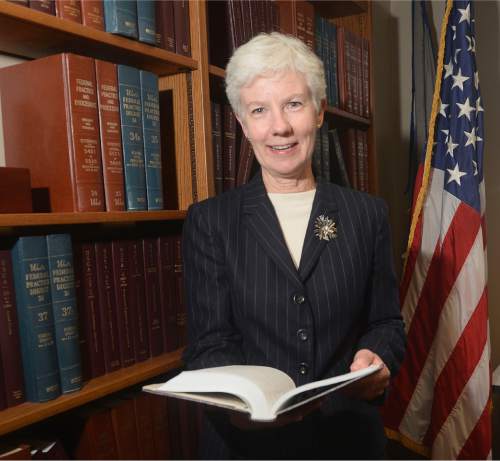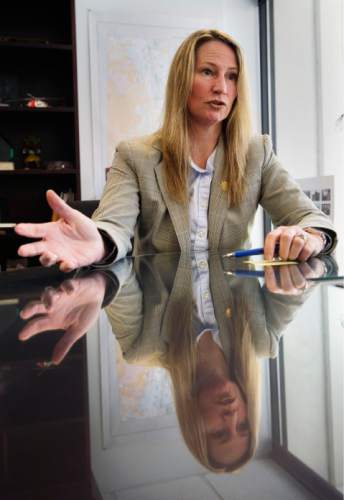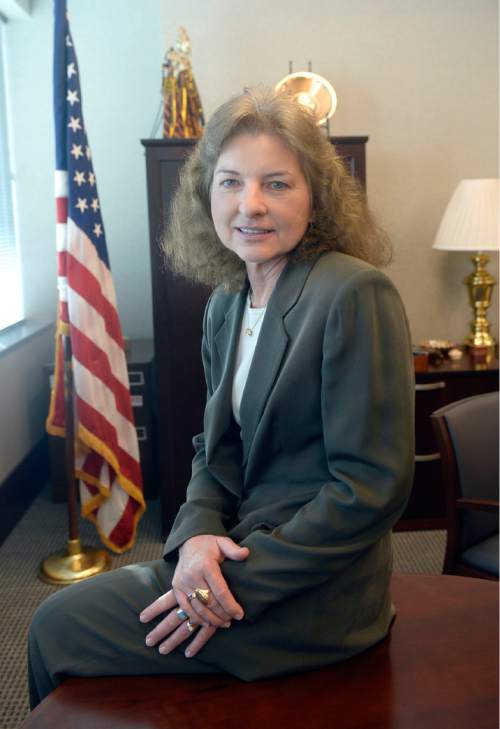This is an archived article that was published on sltrib.com in 2014, and information in the article may be outdated. It is provided only for personal research purposes and may not be reprinted.
When it comes to federal law enforcement in Utah, women rule.
Three of the top feds in the state are female — Nicki Hollmann is the assistant special agent in charge at the Drug Enforcement Administration, Mary Rook is the special agent in charge at the Federal Bureau of Investigation and Carlie Christensen serves as acting U.S. attorney for Utah. The three are the first women to hold these positions in Utah.
Having the trio in the top spots might seen surprising to some, considering a recent study that said Utah is the worst state for women because, among other factors, they are less likely to have leadership roles in government compared to women in other states.
But those familiar with their work aren't surprised at all.
David Barlow, former U.S. attorney for Utah, describes the three as "very dedicated, hard-working public servants."
Salt Lake City police Chief Chris Burbank agrees.
"I've been honored to work with these three women and they represent their organizations extremely well," said Burbank, who is chairman of the Rocky Mountain High-Intensity Drug Trafficking Areas task force, which includes federal agencies.
Hollmann, Rook and Christensen rose to their positions after serving for years on the streets or in the courtroom. Their jobs include solving crimes from bank robbery to human trafficking, taking down drug cartels, investigating possible terrorism plots, enforcing civil rights, weeding out public corruption and prosecuting criminals.
Dream job • Hollmann, 46, who grew up in a small town in Missouri, wanted to work for the DEA since she was 14. Her father, a teacher and coach, was friends with a drug agent who occasionally visited the family.
"He would tell stories and I was completely enamored by the great things he did," said Hollmann.
After graduating in 1990 from Southeast Missouri State University with a degree in criminal justice, Hollmann worked briefly as a patrol officer for the St. Louis County Police Department before getting a job with the DEA. She trained in Quantico, Va., then was assigned to the Kansas City, Mo., office, where she worked from 1991 to 2000.
Hollmann's job included highway interdiction and investigations that predominately involved crack and methamphetamine. She also worked undercover in the roles of drug dealer's girlfriend or courier, which proved a good way to infiltrate the world of illegal narcotics — the dealers and ringleaders weren't expecting a female agent.
One of her more tense encounters took place in Kansas, when an undercover drug buy escalated into a shootout between dealers and agents. Everyone survived and a dealer who had agreed to sell a kilogram of cocaine eventually was sentenced to 6 1/2 years in prison.
After Kansas City, Hollmann had a stint in The Bahamas, then went to Tampa, Fla., where she worked as a group supervisor. Next was a rotation to Washington, D.C.
When the leadership position in Salt Lake City opened up, she applied and began the job in February.
In addition to targeting individual dealers, the DEA goes after major drug rings. The agency coordinates with the rest of the law enforcement community, which significantly increases what can be accomplished and eliminates duplication of resources, Hollmann said.
The Metro Narcotics Task Force — made up of the DEA and nine law enforcement agencies in Salt Lake Valley County — scored a recent success against an enterprise supported by a Mexican cartel with the seizure of 31 pounds of heroin from April to August and the arrest of 21 people.
"None of us could do this alone," Hollmann said. "This is really a great law enforcement community. There's a lot of great police work going on every day."
Targeting criminals • Rook, 55, who grew up in Montana and Kansas, began her FBI career by chance. She earned a degree in zoology from Colorado State University and was considering being a veterinarian or marine biologist but didn't want to start graduate school right away.
The sister of a college friend was considering applying to the FBI but decided against it. On "kind of a whim," Rook filled the form out herself and landed a job as a lab technician.
She worked at the bureau's headquarters in Washington, D.C., for nearly three years, then decided forensics was not her long-term career goal.
"I wanted to be more involved in the investigations," said Rook, who had enjoyed reading Agatha Christie mysteries as a kid.
She applied to be an agent and was one of the 50 out of thousands of applicants who made the cut. For the next two decades, Rook worked in Madison, Wisc., Los Angeles and Washington, D.C.
In 2004, she came to Salt Lake City as the assistant special agent in charge.
After three years in Utah, Rook was assigned to the Helena, Mont., office as assistant special agent in charge, and then went to Quantico, where she was chief of the Law Enforcement Programs Section. Her next stop was Anchorage, Alaska, to serve as the special agent in charge. She took the helm in Salt Lake City in February 2013.
The Salt Lake City Division — the FBI's second largest geographically at 315,000 square miles — covers Utah, Idaho and Montana and includes 19 Indian reservations. Rook said the big territory and remote locations can make travel and investigations challenging.
During her tenure, Rook has overseen complex money laundering cases; sensitive internal investigations in Los Angeles and at FBI headquarters; and probes of drug trafficking organizations and gangs. Her agency also investigates human trafficking
Her high-profile investigations have included a plot by extremists to kill a federal judge in Alaska and alleged wrongdoing by former Utah attorneys general John Swallow and Mark Shurtleff, who have been charged with multiple felonies.
"That's been a huge effort and speaks well of our relationship with other agencies," Rook said of the Swallow/Shurtleff probe, which involved other law enforcement offices.
The FBI coordinates with agencies in other major cases, she said.
"It's the state, the county, the cities — we're all working together to target these criminals," Rook said.
'No-brainer' • A major part of the crime-fighting team in Utah is the U.S. Attorney's Office, which prosecutes criminal cases and represents federal agencies in the state.
Christensen is overseeing matters in her second stint as acting U.S. attorney, which began in July after Barlow resigned to return to private practice. She previously served in the position for nearly two years, in 2010 and 2011, when Brett Tolman, who was Barlow's predecessor, stepped down.
Tolman, now in private practice, said it was a "no-brainer' to pick Christensen for the interim position.
"She was so well-respected, worked so hard and had a way about her that garnered a tremendous amount of loyalty," Tolman said.
He said Christensen, Rook and Hollmann are "remarkable women."
"It's a tribute to Utah when we do start to see the success of some of these great leaders in our state," Tolman said.
Christensen, a Salt Lake City native, graduated from Westminster College with a degree in English and earned her law degree in 1980 at the University of Utah. After graduation, she worked for the Utah Attorney General's Office as an assistant attorney general in the litigation and human resources divisions.
She then went to the State Administrative Office of the Courts and after that, to the U.S. Attorney's Office, where she has worked for almost 24 years.
Much of Christensen's work has been in the civil division, defending federal agencies or taking action to recover money owed to the government. These cases cover a mix of everything — medical malpractice, personal injury, Social Security and public roads, among other topics.
She also has been a part of major criminal cases, including the Elizabeth Smart kidnapping, and was the first woman to serve as First Assistant U.S. Attorney.
Barlow, her former boss, praised Christensen's work.
"She is smart, unflappable, a superb writer, one of the pillars of the office, highly respected by the bench and the bar, and completely committed to the law," Barlow said.
Christensen said her career choice was influenced by her father, who was an attorney in private practice.
"He seemed to find the profession very engaging," she said. "He liked the opportunity to learn about so many things. It [the profession] exposes you to a whole range of disciplines."
Twitter: @PamelaMansonSLC


